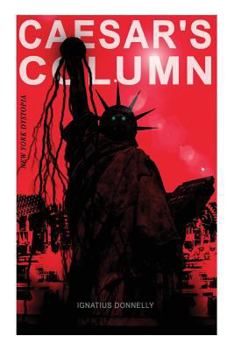CAESAR'S COLUMN (New York Dystopia): A Fascist Nightmare of the Rotten 20th Century American Society - Time Travel Novel From the Renowned Author of A
Select Format
Select Condition 
Book Overview
When Gabriel Weltstein visits New York in 1988 (98 years after the publication of this novel) he is mesmerized by the city and its modern technologies including air travel But little does he know that he is soon going to see the underbelly of the city and those who control everything. Gabriel finds himself outmatched against the Oligarchs who run the entire rapacious and oppressive social and economic order. Can Gabriel escape his worst nightmare? Can he un-see what he has seen and survive to tell the tale? And what is the "Brotherhood of Destruction" and what do they want? Read on Ignatius Donnelly (1831-1901) was a U.S. Congressman, populist writer, and amateur scientist. In 1882, Donnelly published Atlantis: The Antediluvian World, his best known work, detailing theories concerning the mythical lost continent of Atlantis.
Format:Paperback
Language:English
ISBN:8027330041
ISBN13:9788027330041
Release Date:December 2018
Publisher:E-Artnow
Length:164 Pages
Weight:0.72 lbs.
Dimensions:0.3" x 6.0" x 9.0"
Customer Reviews
1 rating
Wonderful Edition
Published by Thriftbooks.com User , 15 years ago
"Cæsar's Column: A Story of the Twentieth Century" by Ignatius Donnelly is the 10th book in the Early Classics of Science Fiction series. "Cæsar's Column" was first published in 1890 and though it is far from a great work, it holds a special place in the history of speculative fiction. The novel deals with a dystopian/utopian future (1988) and draws heavily on the author's own political views. Ignatius Donnelly was a populist politician moving from party to party and switching positions on issues frequently, eventually joining the Republican party and being elected as Lieutenant Governor of Minnesota and then to Congress. Donnelly also became known for his writing, as he wrote about such diverse topics as Atlantis, Ragnarok, and the true authorship of Shakespeare's works. Those were all considered non-fiction works though, and after being discredited he wrote "Cæsar's Column", a fictional work, under the pseudonym of Edmund Boisgilbert, M.D., though this was more of a publicity stunt than a real attempt to conceal his identity. "Cæsar's Column" is an important work in the history of speculative fiction because it is one of the earliest works which brings the ideas of Jules Verne to an American audience, though certainly not with the same level of quality. This work also looks at social Darwinism, and Donnelly's impression of where it will lead the society in the next 100 years. As is a general rule with this series, the quality comes not just with the works being presented, as many of them are far from ideal; but rather it is the supporting documentation which makes them well worth reading. In this case, it is the superb introduction and notes provided by Nicholas Ruddick which make this the ideal edition of this work to read. "Cæsar's Column: A Story of the Twentieth Century" takes place in the year 1988, mostly in New York City in a society which has decayed and lost its ideals. The narrator for much of the story is Gabriel Welstein, a visitor from the Swiss colony of Uganda, an agricultural utopian society. He has come to the U.S. to bypass the global Wool Ring which has monopolized the commodity, and most of the book is in the form of letters which Gabriel is writing to his brother Heinrich. In the city, Gabriel intervenes to save a beggar, who turns out to be Maximilian Petion, an attorney who is part of a brotherhood (the Brotherhood of Destruction) that is working to overthrow the corrupt ruling class. Much of the story deals with Donnelly's views on society and politics and in particular on the concept of social Darwinism. He provides a view of future technology which isn't too far off the mark with airships, city streets alight, though with power obtained from the Aurora Borealis instead of electrical power plants. One could say that the televised newspapers are a foreshadowing of the internet as well. There is some examples of anti-Semitism in the work as well, though as Ruddock discusses in his introduction it is pro






